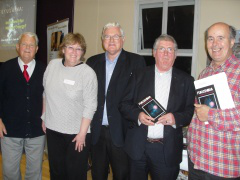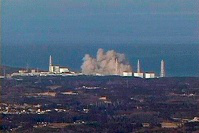Nuclear Industry a 'Pandora's Box'

l-r Bruce Kent, Ellen Teague, Fr Peter Hughes, Fr Sean McDonagh, John Vidal
Nuclear energy has been described as a 'Pandora's Box' by Columban eco-theologian Sean McDonagh. Sean was speaking at the launch on Thursday evening of his latest book - 'FUKUSHIMA: THE DEATH KNELL FOR NUCLEAR ENERGY?' - held at Heythrop College in London. "The nuclear industry began with weapons of mass destruction" he said, "and I would argue that civilian nuclear power is almost as dangerous". He referred here particularly to nuclear waste, pointing out that "no place on Earth is considered a safe repository for plutonium, which must be minded for several hundred thousand years". He condemned placing the custodial responsibility of these dangerous wastes on future generations for centuries to come, suggesting that "we must consider this matter to be an ethical issue". He called for investment in nuclear power to be diverted into investment into cleaner, safer and more localised renewable energies such as solar, wind and wave power. This would go alongside educational campaigns and technologies to reduce energy consumption and deal with peak energy periods. Environment organisations campaigning for the UK's new Energy Bill to focus on building up renewable energy should be supported.
Sean felt that the Fukushima nuclear disaster in Japan during March 2012 has again shown us that nuclear reactors are fundamentally dangerous. None of the world's 435 nuclear reactors are immune to human errors, natural disasters, or any of the many other serious incidents that could cause an accident. Millions of people who live near nuclear reactors are at risk and more than 150,000 people who used to live near Fukushima remain displaced from their homes. However, he felt that, ultimately, economic considerations will be the death knell of the nuclear industry, with the huge expense of setting up new power stations and decommissioning them. In addition, they are uninsurable, so if there are accidents the costs are likely to be met from the public purse. He dismissed nuclear power as a route to reducing carbon emissions in the light of dangerous climate change. "We are told that serious action on climate change needs to happen within the next 4-5 years, but new power stations would take at 16 years or more to be up and running" he said, "and I would argue that from mining uranium to decommissioning nuclear power stations the nuclear industry carries an often hidden carbon emissions toll".
The meeting was chaired by The Guardian's Environment Editor John Vidal who thanked Sean for his books over three decades covering such concerns as Ecocide, Patenting of Life, Climate Change and Nuclear Energy as moral issues.
"You have been described tonight as a prophet, but you are also a damn good journalist" said John, who urged people to buy and read the new book. John went to school in the vicinity of Sellafield in Cumbria - formerly called Windscale, it is the UK's largest and most hazardous site, storing enough high and intermediate level radioactive waste to fill 27 Olympic-sized swimming pools. John said he had watched over the last 30-40 years "how this secretive and dangerous industry has got its claws into government and is almost impossible to disentangle". On 7 November, Britain's National Audit Office said Sellafield posed "an intolerable risk to people and the environment" with hazardous waste stored in run-down buildings. John described a visit he once made to Chernobyl, the site of the world's worst nuclear accident in the Ukraine in 1986, "terrifying", saying "don't believe it when people say that only six people died".
When John invited Bruce Kent, Vice-President of Pax Christi and of CND, to join the panel discussion he commented that "now I have two heroes, on either side of me". Bruce focused on the military use of nuclear power, saying "Britain got nuclear power in order to make bombs". Some nuclear materials, in particular highly enriched plutonium and uranium, may be used for civil purposes or in explosive devices and in all the countries possessing nuclear weapons, progress in civil nuclear science has benefited arms development, and vice versa. Bruce highlighted the proposed massive expenditure of around £67 billion to clean up Sellafield and £80 billion to renew Britain's Trident nuclear missile system, suggesting that nuclear is not a cheap option. "There is a massive need for public education on these issues and for agencies to work together to tackle them" he said. Referring to nuclear waste, he commented, "I find it incredible that lethal material can be left as a legacy for 200,000 years - this is criminal".
One intervention from the floor was from Mo Kelly, a Lancaster-based architect and Pax Christi member, who is challenging the proposed development of a new nuclear power station in the nearby Heysham area. Holding a copy of the publication 'Nuclear Disasters and the Built Environment', she was interested in engaging with other professionals highlighting the short and long term risks involved in nuclear power. She pointed out that the employment in her region of many Catholics in nuclear civilian and military establishments meant that challenging the morality of the nuclear industry often fell on unsympathetic ears in the Catholic community. Yet, in the light of the Fukushima disaster, the Vatican changed its policy on supporting nuclear energy when in October 2011 it declared that nuclear power was neither cheap nor safe. Many Catholic bishops' conferences around the world have also rejected nuclear power, including Japan, Korea, Philippines, India, Germany, and Canada.
Columban Peter Hughes - who heads the Columban Justice, Peace, and Integrity of Creation Team -thanked all the speakers and promised follow-up. The presence of Justice, Peace and Integrity of Creation Links' representatives indicated that some religious orders will also be involved in campaigning against further nuclear power stations in Britain and for an Energy Bill that promotes renewable energy development. During the evening, photos of parishes in the vicinity of Fukushima after the earthquake and tsunami of March 2011 were on display - provided by Columban Dan Horgan, who worked in Japan for 30 years. They showed destroyed buildings and debris. The small Catholic congregations have now largely left parishes in the region because of nuclear contamination.
To order a copy of 'FUKUSHIMA - THE DEATH KNELL FOR NUCLEAR ENERGY?' see: www.columba.ie/Fukushima/423/
For the Friends of the Earth campaign on 'Clean British Energy' see: http://foe.co.uk/what_we_do/clean_british_energy_switch_full_35921.html
















